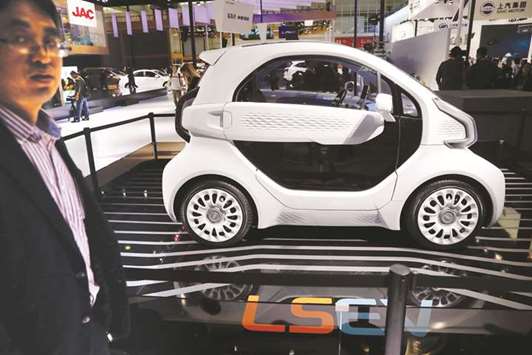Auto executives from across the globe are plugging their plans for an electric car future in China at the Beijing auto show, but they will find their Chinese counterparts are already motoring ahead.
Local carmakers and upstarts flaunted their latest plug-in models at the industry extravaganza this week, from sedans to SUVs and futuristic supercars fitted with the latest gadgets.
While American, Japanese and European auto giants dominate sales of combustion engine vehicles, Chinese firms are in the driver’s seat when it comes to electric cars.
Policymakers in Beijing have been pushing the market to go electric, using a carrot and stick to drag along consumers and automakers through a quota system for manufacturers and subsidies to car buyers.
China hopes to reduce its dependence on imported oil and cut pollution, both strategic priorities for Beijing, and it has announced plans to phase out fossil fuel vehicles at a yet-to-be-decided date.
Unable to seed a company capable of competing on the global stage, the shift conveniently provides China a new opportunity to foster local champions in the world’s largest car market. Unencumbered by history and the billions sunk into refining gasoline engines, electric presents a clean competitive slate for homegrown automakers.
“The entry hurdle is lower with an electric drive train than it has been with a combustion engine, which requires experience or where at least the contenders have experience of 130 years,” Dieter Zetsche, head of Mercedes-Benz cars, said at the auto show.
Zetsche welcomed the Chinese newcomers: “The moment you don’t have competition you get lazy.” But it is unclear if the competition will take place on a level playing field.
“The government is supporting the development of EVs,” said Li Zhuihui, marketing manager at newcomer Hanteng Auto, which is pushing into the electric vehicle market.
“There are financial incentives to research and build electric,” he told AFP.
One key industrial policy wielded by Chinese President Xi Jinping called “Made in China 2025” aims for domestic automakers to control 70% of the electric vehicle market by 2020 and 80% by 2025. Elon Musk, CEO of Tesla motors, compared the environment to “competing in an Olympic race wearing lead shoes”, in a tweet to United States President Donald Trump last month.
Still, China is one of Tesla’s largest markets.
Roughly three-quarters of the gleaming electric car models on display in Beijing are homegrown, reflecting domestic firms’ dominance on their home turf.
Last year new energy vehicles sales exploded 53% to 780,000 units in China, though they still constitute only 2.7% of the market.
International behemoths like Volkswagen and General Motors sold most of the 28.9mn units that changed hands here last year.
Despite both companies – and a heap of other foreign automakers – announcing huge investments in electric projects recently, Chinese companies have beaten them to the pavement. China’s BAIC ranked first in global EV sales last year, turning over 96,000 units, according to data from automotive research firm Jato Dynamics.
Chinese firms ZD, Geely, BYD, Zotye and JAC also racked up enough sales to make the top ten list of EV sales by volume.
In Beijing, car company Nio backed by IT giants Tencent and Lenovo, showed off a line of electric SUVs and supercars at its booth.
Jack Cheng, a co-founder of the startup, admitted the competition was fierce with 200 new players chasing a market the government hopes will reach 2mn in annual sales by 2020.
“Plus by 2020 the big guys are waking up so they may take a chunk of the volume,” Cheng told AFP. “But they are slow,” he said, noting Nio’s edge is the company’s speed and nimbleness.

A LSEV electric car is displayed during a media preview of the Auto China 2018 motor show in Beijing. Global carmakers touted their latest electric and SUV models in Beijing as they warily welcomed China’s promise of better foreign access to the world’s largest auto market, where domestic vehicles are making major inroads. Industry behemoths like Volkswagen, Daimler, Toyota, Nissan, Ford and others are displaying more than 1,000 models and dozens of concept cars at the auto show.
